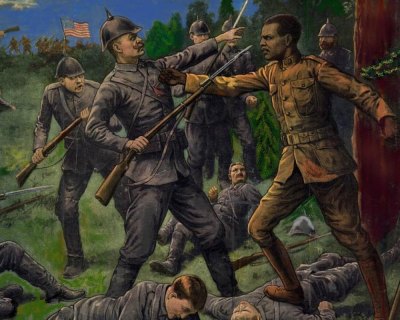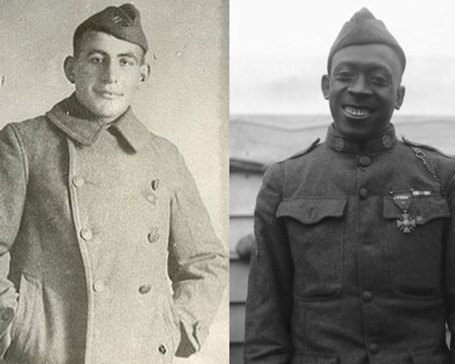
The actions of Sgt. Henry Johnson during World War I were clearly Medal of Honor material. But it took 97 years for the country to acknowledge that fact. June 2 was the day it did.
President Barack Obama awarded the Medal of Honor belatedly to two soldiers, Johnson and Sgt. William Shemin. Johnson, an African-American, and Shemin, who was Jewish, both had been overlooked for the award previously. Here are their stories:
Sgt. Henry Johnson
Johnson was part of the 369th Infantry, an African-American regiment better known as the Harlem Hellfighters. The Hellfighters are described by the National Archives as “among the first regiments to arrive in France, and among the most highly decorated when it returned.”
World War I played out against the backdrop of continued discrimination in the U.S. Even so, 380,000 African-Americans served in the Army. About 200,000 of them were sent to Europe, of which 42,000 were in combat, according to the Archives.
During the ceremony, Obama pointed out that most African-Americans served in labor units, but the 369th was sent to fight alongside the French Army, “which accepted them as their own.”
Once in action, the 369th fought hard, but Johnson stood out.
During the White House ceremony, Obama recounted the events that made Johnson a hero. In the early hours of May 15, 1918, Johnson and another soldier, Pvt. Needham Roberts, stood sentry as other soldiers slept.
"In the predawn it was pitch black and silent and then click, the sound of wire-cutters," Obama recounted. "A German raiding party, at least a dozen soldiers, maybe more, fired a hail of bullets. Henry fired back until his rifle was empty. Then he and Needham threw grenades. Both of them were hit. Needham lost consciousness. Two enemy soldiers began to carry him away, while another provided cover, firing at Henry."
Johnson shoved another magazine into his rifle but it jammed. "He turned the gun around and swung it at one of the enemy, knocking him down. Then he grabbed the only weapon he had left, his bolo knife, and went to rescue Needham. Henry took down one enemy soldier and then the other. The soldier he knocked down with his rifle recovered and Henry was wounded again. But armed with just his knife, Henry took him down too.”
Finally, reinforcements arrived, Obama concluded. “As the sun rose, the scale of what happened became clear. In just a few minutes of fighting, two Americans had defeated an entire raiding party and Henry Johnson had saved his fellow soldier from being taken prisoner."
Smithsonian magazine reports that Johnson's nickname in combat was "Black Death." In an account of the events published in 2011, the magazine reported that Johnson killed four Germans and wounded an estimated 10 to 20 more.
The French were impressed: Johnson became one of the first Americans awarded the French Croix de Guerre avec Palme, that country's highest award for valor, according to the U.S. Army website about Johnson.
The Army used Johnson's image in recruiting posters, and when he returned from the war, he rode in a car during a parade.
But Johnson was awarded nothing of substance by the U.S. government, “not even the Purple Heart, although he had been wounded 21 times,” Obama said.
Johnson’s injuries prevented him from working again in the job he had left behind when he went to war -- as a redcap porter at the train station. Smithsonian magazine reported that he was also denied disability allowance.
Unemployable, Johnson began to drink, and his wife and children left him. Penniless, he died in 1929 at 32.
In 1996, President Bill Clinton awarded Johnson the Purple Heart. In 2002, he was posthumously awarded the Distinguished Service Cross.
Sgt. William Shemin
The June 2 ceremony also honored another unsung hero, William Shemin of the 47th Infantry.“On Aug 7, 1918, on the western front, the allies were hunkered down in one trench, the Germans in another, separated by about 150 yards of open space, just a football field and a half. But that open space was a blood bath," Obama said. "Soldier after soldier ventured out and soldier after soldier was mowed down. Those still in the trenches were left with a terrible choice: die trying to rescue your fellow soldier, or watch him die knowing that part of you will die along with him.”
The 21-year-old Shemin ran into no man’s land and dragged a wounded comrade to safety. “And then he did it again and again,” Obama said.
With officers among the casualties, Shemin reorganized depleted squads. Every time there was a lull in combat, he led rescues of the wounded, until he, too, was hit on Aug. 9, taking shrapnel and a machine gun bullet that pierced his helmet and lodged behind his left ear, the Army website recounts. Shemin received a Distinguished Service Cross and the Purple Heart.
After the war, Shemin went to college, got a degree in forestry, started a family and set up a landscaping business. He and his wife raised three children. In time, there were 14 grandchildren.
Shemin bought a house in upstate New York where the grandchildren spent summers riding horses and swimming. He taught them how to salute, how to raise the flag every morning and how to lower it and fold it every night, Obama said. He died in 1973.
One of Shemin's daughters, now in her 80s, told Obama she had a theory about why her father was willing to do anything for his country.
He was the son of Russian immigrants, and his family went through the pogroms. "They saw towns destroyed and children killed and then they came to America and here they found a haven."
Because Shemin and his sister went to college, they transformed the family in one generation. "That’s what America meant to him," Obama said.
Indeed, when World War II began, Shemin, then 40-something and limping, attempted to join the Army again. He said he knew something about building roads and camouflage. The Army turned him down.
Obama pointed out that Johnson and Shemin are only two among many servicemen and women whose stories are untold.
"America is the country it is today because of people like Henry and William," he said. "The least we can do is say we know who you are, we know what you did for us. We are forever grateful.”
Recommended:
- The National Archives: Photographs of the 369th Infantry and African Americans during World War I
- Smithsonian Magazine: Remembering Henry Johnson, the soldier called "Black Death"
- The U.S. Army website: Medal of Honor -- Sergeant William Shemin
- The U.S. Army website: Medal of Honor -- Sergeant Henry Johnson
Related:
How the first world war got its name
100 years ago: 5 reasons World War I started
World War I, Day One: July 28, 1914
If you would like to comment, contact StudyHall.Rocks or like us on Facebook and tell us what you think.
